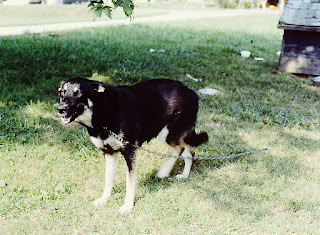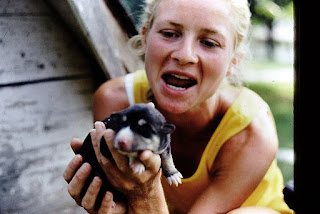“Looks like you’ll be having puppies in a few months!” I shouted over to the next door neighbor. She was carrying a bag of groceries from the driveway to her back door as I was making my way from the kiln in my backyard to my house.
I was smiling as I shouted it, but there was an underlying anger in my words. I hadn’t been living next door long, but it was long enough to have observed the lack of care they showed their dog, a black and tan “shepherd mix” named Dusty.
The neighbor asked, “How do you know?”
“That you’re expecting puppies?” I responded.
“Yeah, that.”
That pulled me up short. Since everyone knows how puppies are made, I had to assume she was wondering what I knew that she didn’t. “Well, every male dog in the neighborhood has been visiting Dusty for the past few days now.”
The neighbor took enough steps in my direction to allow a peek around the corner of the garage that was standing between her and Dusty. She looked back at the dog that happened to be, at that very moment, looking hopefully at the back of the house. The woman then let out what I assumed to be a resigned “Huh.” I didn’t actually hear it, but she turned back around wordlessly and walked into the house.
I know I should have been more sympathetic to the family next door. Maybe now, as an old man, I would be. I was 24 or 25 at that time and my own hard times were yet to come. But the family next door consisted of that woman -- my age – 24 or 25 herself, but with 4 kids already who appeared to range from about 7 to 9 years of age (I’m guessing not all hers) and a sometimes man. He showed up occasionally. Very occasionally. I can see it now. She had it hard.
The house itself was a tumbledown rental with a garage that leaned badly – much of its skeleton showing through rotted siding and blown off roofing. Rumor had it that the bathroom in the house had a hole in the floor that opened straight down to dirt. Apparently they straddled the hole to stand at the sink.
So the situation was a sad one next door. But there was Dusty. And Dusty was who I saw every day. Every boring dog day. Every boring dog day that progressed from the springtime of our arrival, to the heat of summer and on through that first year of our life on Clark Street.
My pottery was in the basement back in those days. I can remember the warm early summer morning I heard Dar calling me from the backyard, asking me to come quickly. I dried my hands, walked up the stairs, out the door and back to where Dar was kneeling over a proud and smiling Dusty. Six puppies. Mixed lineage.
One or two at a time, somehow the puppies found homes and life returned to boring normal for Dusty.
Dusty’s entire existence was limited to what lay within the reach of her 10 foot chain. Her world was a wooden box for shelter, holes she’d dug for the cool of earth, and a food/water bowl that got filled whenever her owners remembered to do so.
You’d think with four young kids around, Dusty would get some attention and play. Rarely. Every once in a while. Every once in a great while. Mostly she lay around or sat up and perked at the least environmental change that held the possibility of relief from her boredom.
Perhaps the most painful thing to witness from our distance was Dusty watching as kids played in the backyard, totally oblivious to Dusty’s existence as she sat at rapt and hopeful attention looking on.
But there was that day I heard some shouts of play. I stepped out the back door to the miraculous happening – the kids had let Dusty off of her chain and they were actually throwing a tennis ball for her. And she was retrieving it like a champ. I’m not kidding. Having watched Dusty languish at the end of her chain 24 hours a day, I almost couldn’t believe my eyes.
She was lightning fast.
One of the kids, noticing me, hollered, “Hey, watch this” So I watched as, with all his might he heaved the ball into the empty lot behind their house. Sure enough, before the tennis ball could bounce twice, Dusty had already grabbed it out of the air and was circling back toward the boy, tennis ball in her mouth and ready for more.
I made my way over to the kids playing and realized that that had become the game – the fact that they couldn’t throw the ball far enough that Dusty couldn’t retrieve it before it bounced twice had become the game. One of them asked me “Hey, mister, you throw it. You can throw it further than we can. See if you can throw it far enough that Dusty can’t get it in one bounce.”
Well, I probably could, but given the confines of the empty lot and the surrounding streets, I wasn’t going to throw it for all I was worth and send Dusty running into traffic. But even throwing it further than the kids could, Dusty did still get every throw before the second bounce. She was amazing.
But the play was too soon over and never happened again that year.
And as that year went on, we didn’t just let the neglect of Dusty happen. Without confrontation or permission, Dar and I just started feeding Dusty and making sure she had water. Her box was only about 30 ft from my kiln shed, so I would talk to her as I loaded firings.
And if she did happen to ever get loose – like the time that in her terror she broke her chain during a thunderstorm – she didn’t run away. No, she would make her way over to our back stoop and lay on it ‘til we came outside. I never took her back. I made the neighbors come and get her. I couldn’t bring myself to hook her back to her chain. They’d have to do that.
Dusty was a beautiful dog. Really beautiful. She was proportioned nicely – trim and athletic – and in spite of the lack of care, her medium length black coat was glossy and thick with a mahogany underside that added a richness of color. The tan eyebrows made Dusty’s gaze quite expressive.
When we left for shows we hired a young neighbor girl to feed Dusty and make sure she had water. And there was the day Dar shouted down to the basement again. “Come here!” She led me back to Dusty who was lying by her box. Dar talked gently to her and rolled her over to expose a belly absolutely crawling with fleas. So flea dusting became yet another part of our routine.
Then one day Dusty was gone. Gone was the box and chain. Gone were the neighbors and their children. It wasn’t unexpected, but it was sudden. We were left with an empty feeling. We did what people do – we hoped. We hoped, with no good reason behind that hope that maybe the family would pass Dusty along to some family who could appreciate what they had in a great dog. We wrote ourselves a fiction to pacify our minds. Since we would just never know, maybe the fiction would hold up.
That was my mid-twenties.
In my mid-thirties – some 8-10 years on -- I was teaching a class of youngsters in Sunday School. We were between class and services when I happened to overhear a conversation between two of the young boys in my class…
“…and no matter how hard we throw it, Dusty could always get it in one bounce.”
“What?!” I interrupted the two kids.
“This neighborhood dog. It belongs to an old woman in the neighborhood, but we all play with the dog. You can’t believe how fast this dog is.”
“Seriously?” I asked. I was incredulous. “The dog’s name is “Dusty”?”
“Yeah”
“Well, what does Dusty look like?” I prodded
“She’s kinda like a German Shepherd except she’s kinda smaller and black and brown.”
I didn’t know where this kid lived but got that information from him. I had to know. I mean, sure it’s probably more than ten years later, but what other dog could it be? So I arranged to meet the kid in his neighborhood that next weekend. He promised to show me where the old woman lived with the dog named “Dusty”.
Dusty was apparently still alive.
I showed up that next weekend and, true to his word, the young boy walked me down the street from his house to the house in question. Along the way some of the other neighborhood kids -- having gotten wind of my curious quest -- joined us. We acquired a small band of young onlookers.
I walked up the short drive and the walkway and pulled open the storm door so I could knock on the wooden front door. After some time the door finally opened. There stood a tiny, fragile, and very frightened older woman who couldn’t imagine what was going on.
She had the paranoid eyes of someone who has suffered enough in life to know that her worst fears were usually warranted. What good could come from a tall young man standing at her door asking her about the ONE thing in life that gave her joy – her dog?
None. That’s what.
She had no way of knowing.
Thankfully, Dar was along. Dar has a way with older people. I don’t know how to explain it or describe it – I think it’s in Dar’s eyes – but old people are drawn to Dar like gravity. As Dar stepped around me and started talking to the older woman, I could see at least some of the fear melt away.
And she finally understood the gist of our visit. We weren’t there to take her dog away (though she never totally let go of that fear – continually explaining how she cares for the dog, long after we’d tried to assure her that we only wanted to see the dog we used to care for).
At last she reluctantly let us in the door to see Dusty.
And there she was. Dusty. …lying totally spread out and relaxed atop the couch in the middle of the living room -- the obvious center of this old woman’s existence. Dusty had a fan gently blowing across her. A queen on her throne. Cleopatra on her litter.
A few of the neighborhood kids had barged their way into the door behind us, made their way around us in the small room, and were kneeling around Dusty on the couch and petting her – obviously a common welcome in this home where this woman -- and in this neighborhood where these kids -- loved this dog.
And Dusty was …uh…heavy. Well-fed. Spoiled, even. A little grey around the muzzle, but it was definitely Dusty.
Allow me the fiction that Dusty looked up at me and smiled?








